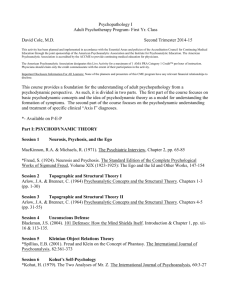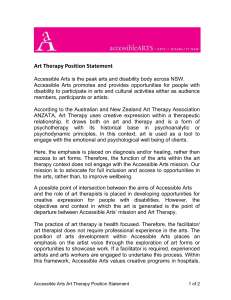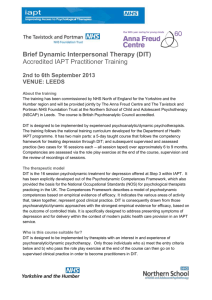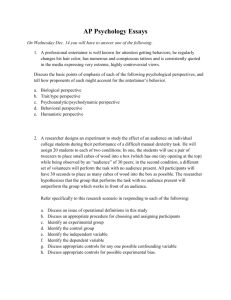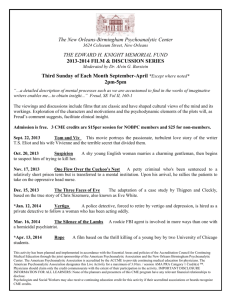NOS Psychodynamic & Psychoanalytic Therapy
advertisement
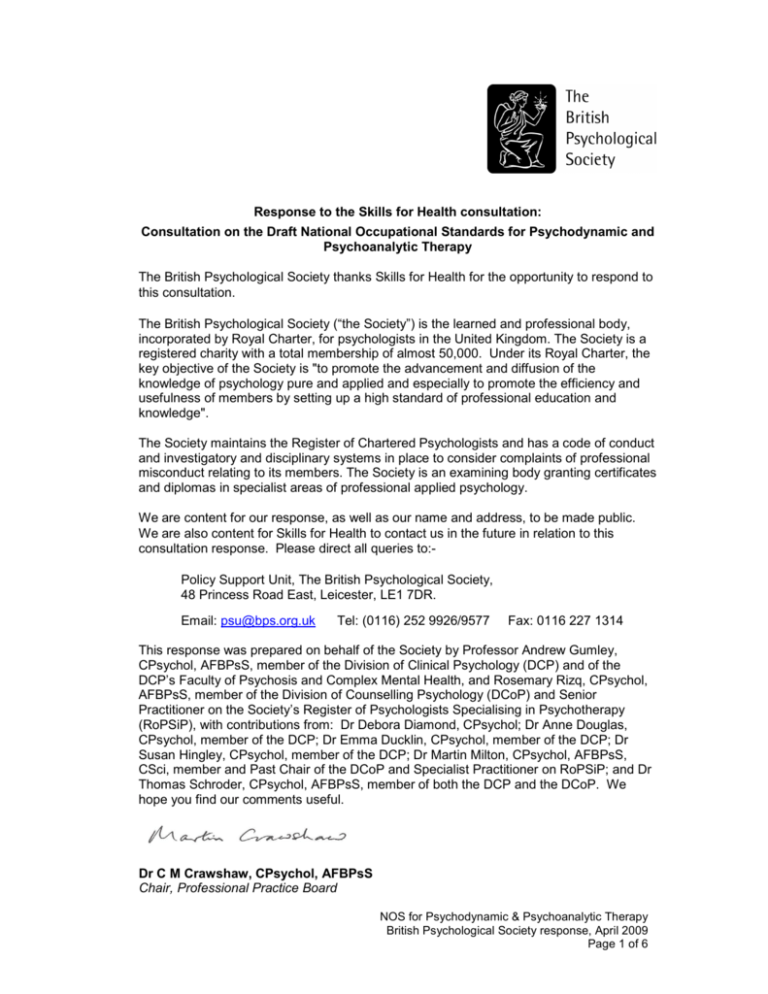
Response to the Skills for Health consultation: Consultation on the Draft National Occupational Standards for Psychodynamic and Psychoanalytic Therapy The British Psychological Society thanks Skills for Health for the opportunity to respond to this consultation. The British Psychological Society (“the Society”) is the learned and professional body, incorporated by Royal Charter, for psychologists in the United Kingdom. The Society is a registered charity with a total membership of almost 50,000. Under its Royal Charter, the key objective of the Society is "to promote the advancement and diffusion of the knowledge of psychology pure and applied and especially to promote the efficiency and usefulness of members by setting up a high standard of professional education and knowledge". The Society maintains the Register of Chartered Psychologists and has a code of conduct and investigatory and disciplinary systems in place to consider complaints of professional misconduct relating to its members. The Society is an examining body granting certificates and diplomas in specialist areas of professional applied psychology. We are content for our response, as well as our name and address, to be made public. We are also content for Skills for Health to contact us in the future in relation to this consultation response. Please direct all queries to:Policy Support Unit, The British Psychological Society, 48 Princess Road East, Leicester, LE1 7DR. Email: psu@bps.org.uk Tel: (0116) 252 9926/9577 Fax: 0116 227 1314 This response was prepared on behalf of the Society by Professor Andrew Gumley, CPsychol, AFBPsS, member of the Division of Clinical Psychology (DCP) and of the DCP’s Faculty of Psychosis and Complex Mental Health, and Rosemary Rizq, CPsychol, AFBPsS, member of the Division of Counselling Psychology (DCoP) and Senior Practitioner on the Society’s Register of Psychologists Specialising in Psychotherapy (RoPSiP), with contributions from: Dr Debora Diamond, CPsychol; Dr Anne Douglas, CPsychol, member of the DCP; Dr Emma Ducklin, CPsychol, member of the DCP; Dr Susan Hingley, CPsychol, member of the DCP; Dr Martin Milton, CPsychol, AFBPsS, CSci, member and Past Chair of the DCoP and Specialist Practitioner on RoPSiP; and Dr Thomas Schroder, CPsychol, AFBPsS, member of both the DCP and the DCoP. We hope you find our comments useful. Dr C M Crawshaw, CPsychol, AFBPsS Chair, Professional Practice Board NOS for Psychodynamic & Psychoanalytic Therapy British Psychological Society response, April 2009 Page 1 of 6 Response Introduction The development of National Occupational Standards (NOS) for psychoanalytic/ psychodynamic therapy is both welcome and timely. Competency models are of potential value to psychologists, professional training institutions and the public, and the Society is pleased to contribute to this consultation. However, we have identified several substantive problems with the draft NOS for psychoanalytic/psychodynamic psychotherapy as they currently stand. Accordingly, our response addresses these wider issues, rather than offering a detailed commentary on each competency. Our concerns relate to the following areas: 1. 2. 3. 4. 5. 6. 1. The relationship between the psychoanalytic/psychodynamic psychotherapy competence framework and the NOS; The context of the NOS; The evidence base used to support the NOS; The healthcare focus of the NOS; Lack of clarity about the levels of competency required for differing disciplines working in a psychoanalytic/psychodynamic modality; Further issues. The Relationship Between the Psychoanalytic/psychodynamic Competence Framework and the NOS The Society notes that the draft NOS are derived from the work of Lemma, Roth and Pilling (2008) who were commissioned by Skills for Health to identify the competences associated with the delivery of high quality psychoanalytic/psychodynamic therapy. Their report, overseen by the Expert Reference Group, offers a substantial, carefully considered framework within which to consider, contextualise and carry out psychotherapeutic work in a psychoanalytic/psychodynamic modality. We would like to acknowledge the value of the work undertaken by Lemma et al. and concur that this is potentially a useful step towards clarifying and articulating the variety and complexity of skills and competences required in this field of clinical practice. However, we note that, in their current form, the NOS appear to constitute only a small part of the above inter-related framework, which in its entirety includes: • • • • • generic competences; basic psychoanalytic/psychodynamic competences; specific psychoanalytic/psychodynamic competences; problem-specific psychoanalytic/psychodynamic skills; and metacompetences. The draft NOS include only the basic psychoanalytic/psychodynamic competences, and appear to offer an extremely lengthy, ‘stand alone’ list of performance criteria, knowledge and skills. The Lemma et al. report makes it clear that effective delivery of psychoanalytic therapy depends on blending a range of generic, basic, specific, NOS for Psychodynamic & Psychoanalytic Therapy British Psychological Society response, April 2009 Page 2 of 6 problem-specific and metacompetences, according to the client, the presenting problem and the clinical judgement of the practitioner: ‘Delivering effective therapy involves the application of parallel sets of knowledge and skills, and any temptation to reduce it to a collection of disaggregated activities should be avoided. Therapists of all persuasions need to operate using clinical judgment in combination with their technical skills, interweaving technique with a consistent regard for the relationship between themselves and their clients’ (Lemma et al., p.27). As currently drafted, the NOS appear to have reduced this complex framework of interrelated skills to a single, lengthy list of competences supplemented by yet a further catalogue of skills. This leaves the competences lacking in both application and context, and runs the risk of psychoanalytic/psychodynamic psychotherapy being delivered by practitioners - and taught by trainers - in a ‘cook book’ fashion. It is the Society’s view that all therapists offering safe and effective psychoanalytic/psychodynamic psychotherapy should be able to offer skills in generic, basic, specific and metacompetences. When working with specific clinical problems, such as borderline personality disorder, additional skills may be required as suggested by the problem-specific psychoanalytic/psychodynamic competences. In our view, considerably more work is needed on defining a clear and consistent relationship between the competency framework of Lemma et al., and the NOS. Without this link, such an exhaustive and repetitive list of competences is unworkable in practice and therefore unlikely to be fit for purpose either by practitioners or by trainers. 2. The Context of the NOS As currently drafted, the NOS fail to reflect the professional context within which they will be applied. The Lemma et al. report makes it clear that the competency framework may be deployed in commissioning, clinical governance and health service organisation of psychoanalytic/psychodynamic therapy and may inform supervision, training, statutory registration and research within this modality. The Society considers it important to explain the way in which the NOS are to be used within psychological training and clinical practice. In particular, it should be clearly and unambiguously stated whether the NOS are to be used as a guide only, or whether they are to be used prescriptively. In view of the imminent statutory regulation of psychologists by the Health Professions Council (HPC), the anticipated relationship between the NOS for psychoanalytic/psychodynamic therapy and the HPC Standards of Proficiency (SoPs) should be clarified and articulated. 3. The Evidence Base Used to Support the NOS The Society supports the effort to ensure that the competences underpinning the NOS are evidence-based. We note that the draft NOS are derived from evidence abstracted from manualised treatments and randomised controlled trials (RCTs) of psychoanalytic/psychodynamic psychotherapy. NOS for Psychodynamic & Psychoanalytic Therapy British Psychological Society response, April 2009 Page 3 of 6 However, we recognise that there are well rehearsed problems with RCTs (Westen, Novotny & Thompson-Brenner, 2004). In particular, patient samples included in RCTs are carefully selected to ensure homogeneity, and cannot be considered representative of the more complex clinical populations that ordinary practitioners deal with in real-life clinical situations. Given that these competences appear to be designed specifically for use in healthcare/NHS contexts, where psychologists routinely work with multiple problems and complex co-morbidities, the utility and validity of competences derived mainly from treatment manuals could reasonably be questioned. Whilst acknowledging the position of Lemma et al., we are aware of the wider frame of reference with regard to establishing evidence-based practice that is endorsed by many in the clinical and research community. We note the stance adopted by the American Psychological Association’s Task Force on Evidence-Based Practice (American Psychological Association, 2006), which effectively re-defines evidencebased practice as: ‘the integration of the best available research with clinical expertise in the context of patient characteristics, culture, and preferences’ (p.273). The modality-specific evidence base privileged by the NOS fails to take empirical evidence relating to naturalistic effectiveness studies into consideration (Leichsenring, 2009). These studies tend to focus on the therapeutic relationship and therapist variables, rather than diagnostic categories; they emphasise therapeutic process rather than manualised procedures; and they examine clinical techniques that are aligned with patient choice and clinical judgement rather than those designed to ensure standardisation. Such studies are empirically wellsupported and may have considerably more external validity – and clinical utility – than some studies included in RCTs. The Society values a pluralistic approach to establishing an evidence base for psychoanalytic/psychodynamic psychotherapy, including evidence derived from, for example, qualitative research, systematic case studies, single case designs, public health and ethnographic studies, process-outcome research and practice-based evidence. As currently drafted, the evidence base from which the psychoanalytic/psychodynamic NOS have been derived does not appear to reflect this wider frame of reference. 4. The Healthcare Focus of the NOS The Society notes a clear healthcare/NHS focus to this set of competences and to the language used to describe them. Psychologists work across a variety of occupations, setting and contexts – for example, children, adolescents, disability services, voluntary services, educational settings, pastoral, workplace and independent sectors. Psychoanalytic/psychodynamic competences that are appropriate for healthcare settings may not be appropriate for other settings, particularly where clients enter into therapy for developmental or personal growth reasons. It is our view that competences should reflect skills required for all contexts within which psychoanalytic/psychodynamic psychotherapy is offered. This is particularly important if, as seems likely, the NOS will be used to inform standards of proficiency for psychologists regulated by the HPC. Statutory regulation will include psychologists who undertake therapeutic work within all the above occupational settings. NOS for Psychodynamic & Psychoanalytic Therapy British Psychological Society response, April 2009 Page 4 of 6 5. Lack of Clarity about Level of Competency Required for Differing Disciplines Working in a Psychoanalytic/psychodynamic Modality There is a lack of clarity about what constitutes an appropriate level of competency required to deliver psychoanalytic/psychodynamic psychotherapy. The NOS make repeated reference to ‘working knowledge’ or ‘in depth knowledge’. However, it is not clear if or how these terms map on to those already benchmarked by the Quality Assurance Agency’s (QAA) Framework for Higher Education (Quality Assurance Agency, 2001). The QAA descriptors include ‘critical understanding’, a level that we would consider appropriate to psychologists training and working within a psychoanalytic/psychodynamic modality. The Society also notes that, despite the emphasis on the necessity for an evidence base to the NOS, and the claim that a competency framework can contribute to the field of psychological research, there is no mention in the draft NOS of knowledge of the relevant research literature nor of a critical awareness of the application of research findings to psychoanalytic/psychodynamic psychotherapy. Along with clinical and scientific training, theoretical understanding and ongoing selfreflection, we consider the evaluation and use of research evidence to be a distinctive component of the training and practice of psychologists working in a psychoanalytic/psychodynamic modality. Indeed, evidence-based practice requires that psychologists recognise the strengths and limitations of evidence derived from widely differing types of research. Since individual patients may require decisions not always directly addressed by the available research evidence, this is an issue that is heavily dependent on the capacity of the individual practitioner to consider the evidence, and adapt and individualise psychoanalytic/psychodynamic interventions to suit clinical need, cultural context and patient acceptability. This in turn relates to the need for a clearer definition of metacompetences in the NOS, including the capacity to select the most appropriate analytic/dynamic intervention. Differing professions using psychoanalytic/psychodynamic interventions will be trained in, and employ, differing metacompetences, and not all will have the same training and expertise in psychological science and research as psychologists. In our view, the NOS must include: • • 6. an unambiguous definition about the level of competence considered essential for all therapists working in a psychoanalytic/psychodynamic modality; AND a clear definition of competences and metacompetences that are considered additional and specific to particular disciplines in the field. Further Issues The Society notes three further areas of concern emerging from the draft NOS: a. b. There appears to be an overemphasis on risk as something to be avoided in therapeutic work. Risk is something that cannot be eliminated entirely when undertaking clinical work. The NOS should include more detail about how to engage with risk in a thoughtful way during psychoanalytic/psychodynamic therapy rather than how to forestall or stop it. There is insufficient emphasis on issues of ethnic, cultural and sexual difference, and lack of explicit detail about how to address areas of difference in psychoanalytic/psychodynamic psychotherapy. NOS for Psychodynamic & Psychoanalytic Therapy British Psychological Society response, April 2009 Page 5 of 6 c. There is insufficient attention paid to the importance of practitioners engaging with their own psychoanalytic psychotherapy as a prerequisite for undertaking safe and effective clinical practice. Research has suggested that therapists undertaking their own therapy may be an important factor in safeguarding public confidence (Mace, 2001). In our view, an experience of personal psychotherapy is central to the training and practice of psychologists working psychoanalytically or psychodynamically. This should be specified in the NOS: for example, as an analytic-specific metacompetence as outlined in the Lemma et al. report. References American Psychological Association (2006). Presidential Task Force Report on EvidenceBased Practice. American Psychologist, 61(4), 271-285. Leichsenring, F. (2009). Psychodynamic Psychotherapy: A review of efficacy and effectiveness studies. In R. Levy & S. Ablon. (Eds.) Handbook of Evidence Based Psychodynamic Psychotherapy: Bridging the gap between science and practice (Chapter 1). Totowa, New Jersey: Humana Press. Lemma, A., Roth, A., & Pilling, S. (2008). The Competences Required to Deliver Effective Psychoanalytic/psychodynamic Therapy. London: Research Department of Clinical, Educational and Health Psychology, University College London. Available for download from: http://www.ucl.ac.uk/clinicalpsychology/CORE/Psychodynamic_Competences/Background_Paper.pdf Mace, C. (2001). Personal Therapy in Psychiatric Training. Psychiatric Bulletin, 25, 3-4. Quality Assurance Agency (2001). The Framework for Higher Education Qualifications in England, Wales and Northern Ireland. Gloucester: Quality Assurance Agency. Available for download from: http://www.qaa.ac.uk/academicinfrastructure/fheq/EWNI/default.asp Westen, D., Novotny, C.M. & Thompson-Brenner, H. (2004). The Empirical Status of Empirically Supported Psychotherapies: Assumptions, findings, and reporting in controlled clinical trials. Psychotherapy Bulletin, 130, 631-663. End. NOS for Psychodynamic & Psychoanalytic Therapy British Psychological Society response, April 2009 Page 6 of 6

